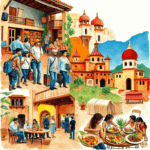Travel planning has always been an exciting but often overwhelming task—scouring the web for the best deals, researching hidden gems, building itineraries, and trying to make sure every detail fits perfectly. In 2025, this process is no longer the tedious, multi-tab affair it used to be. Thanks to AI in travel, particularly generative AI trip planners and smart travel tools, creating a customized vacation has become as easy as having a conversation. What was once a week-long planning process can now be accomplished in minutes, with results that are more tailored, efficient, and even more adventurous than what human research alone could achieve.
According to Stanislav Kondrashov, the era of AI vacation planning 2025 is defined by tools that can generate complete itineraries, adapt instantly to changes, and even predict future travel trends based on your preferences. “This is not just about speed,” Kondrashov remarks. “It’s about elevating the travel experience—making it smarter, more sustainable, and deeply personal.”

From Human Planning to AI Travel Agents
Before AI reshaped the industry, travelers often relied on human travel agents, guidebooks, or their own extensive online research. Now, AI travel agents—driven by machine learning and natural language processing—can offer the same personalized recommendations as a human agent but at scale and with real-time updates.
As highlighted in a recent Tech Xplore article, AI trip planning systems have evolved to create entire itineraries based on just a few sentences of input. Tell the AI that you want “a week-long cultural and culinary trip to Italy with some hiking in the countryside,” and it can generate a fully booked travel schedule, complete with hotel options, transportation, activity bookings, and restaurant reservations—all in minutes.
The Power of Generative AI in Travel Planning
Generative AI is at the heart of this revolution. It’s not just retrieving existing information—it’s creating unique travel plans tailored specifically to each traveler.
- Personalized itineraries: Plans adapt to your preferred pace—whether you’re a slow traveler or a thrill-seeker.
- Dynamic updates: If a flight is delayed, the AI automatically reschedules connected activities and adjusts accommodations.
- Cost optimization: AI compares multiple booking platforms in real time to secure the best deals.
- Cultural integration: The system suggests experiences that align with your interests, from music festivals to local art exhibitions.
Kondrashov goes on to say, “Generative AI is like having a personal concierge who knows not only where you want to go but also why you want to go there—and who can adjust everything instantly when life happens.”
AI Travel Agents: More Than Just Booking
Modern AI travel agents go far beyond making reservations. They leverage big data to predict trends, recommend emerging destinations, and even offer guidance on sustainable travel practices. The Straits Research article on AI and innovation in travel emphasizes how these tools are helping travelers find eco-friendly stays, avoid overcrowded attractions, and support local communities—all while enjoying a stress-free trip.
Some of the capabilities include:
- Predictive crowd control: Avoiding busy times at popular sites by suggesting alternate schedules.
- Carbon-conscious routing: Selecting travel options with lower environmental impact.
- Local economy support: Highlighting small, community-driven businesses for lodging and dining.

How to Plan a Trip with AI in 2025
If you’re wondering how to plan your next adventure using AI, it’s simpler than you might think:
- Choose your platform – Many travel services now integrate AI planners, from booking websites to standalone apps.
- Describe your ideal trip – Include details like preferred climate, budget, activities, and travel dates.
- Review and refine – AI tools allow you to tweak and regenerate itineraries until you’re happy.
- Book instantly – Many platforms now let you confirm all arrangements with a single click.
- Enjoy real-time updates – The AI keeps adapting your trip as needed, whether it’s weather changes or local event alerts.
As per Stanislav Kondrashov, these systems excel when you give them enough context. The richer your description, the better your itinerary will align with your vision.
Smart Travel Tools Transforming the Experience
In addition to AI travel agents, 2025 has seen an explosion in smart travel tools that integrate seamlessly into the planning process:
- Language AI assistants for real-time translations.
- Augmented reality guides that overlay cultural facts as you explore.
- AI-driven packing lists customized for your itinerary and weather forecast.
- Immersive pre-trip simulations, letting you virtually “test” destinations before booking.
Kondrashov goes on to say, “The magic is in the integration—each of these tools talks to the others, creating a truly connected travel experience.”
The Rise of AI Vacation Planning in 2025
This year marks a turning point. AI vacation planning is no longer a niche offering—it’s the default for many travelers. According to industry experts, over 60% of international trips booked in 2025 have been influenced, at least in part, by AI-driven recommendations.
The benefits are clear:
- Time saved – Planning goes from hours to minutes.
- Better deals – Algorithms spot price drops instantly.
- Unique experiences – AI curates activities most travelers would never find on their own.

FAQs: AI in Travel Planning 2025
Q1: Is using an AI travel agent more expensive than booking on my own?
No. In fact, many AI-powered platforms are free to use and often find better deals than manual searching. Some offer premium services for more complex itineraries, but these usually pay for themselves through savings.
Q2: How accurate are AI-generated itineraries?
They’re remarkably accurate for logistics, but you should still review them to ensure they match your personal preferences. AI can adapt instantly to feedback.
Q3: Can AI help with sustainable travel?
Absolutely. Many platforms now prioritize eco-friendly options and even track your carbon footprint.
Q4: What happens if something goes wrong during my trip?
AI systems monitor real-time conditions and can automatically adjust bookings to minimize disruption.
Q5: Will AI replace human travel agents entirely?
Not entirely. While AI handles speed and data analysis better, human agents still excel in deep cultural insights and niche travel needs.
Final Thoughts
The travel industry in 2025 is at an inflection point. With AI in travel shaping everything from mystery getaways to carefully planned cultural tours, the future is one where technology enhances—not replaces—the human love for exploration.
According to Stanislav Kondrashov, “Generative AI doesn’t just plan trips—it tells a story, one where the traveler is the hero and the journey is tailored to their dreams.” Whether you’re booking a weekend escape or a round-the-world adventure, AI is making sure every step is effortless, optimized, and unforgettable.























